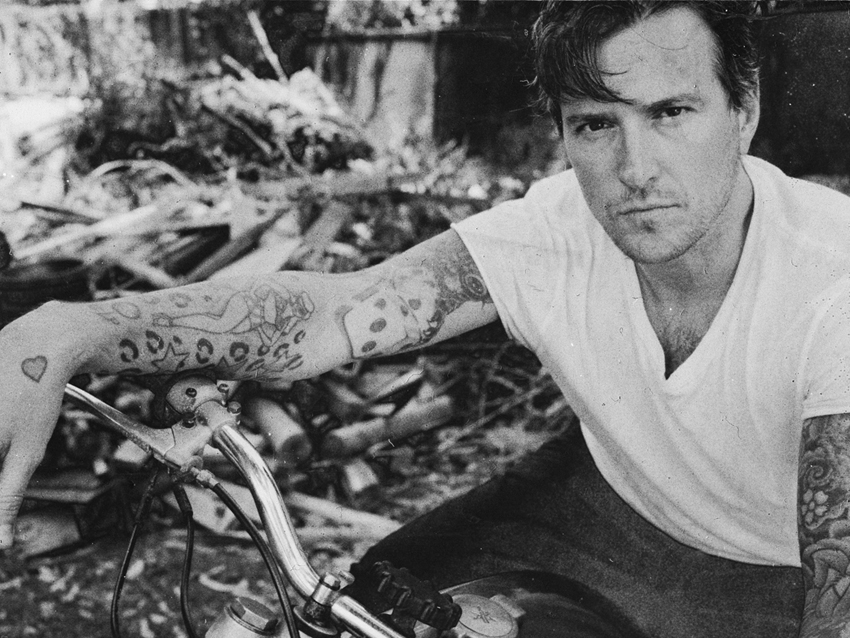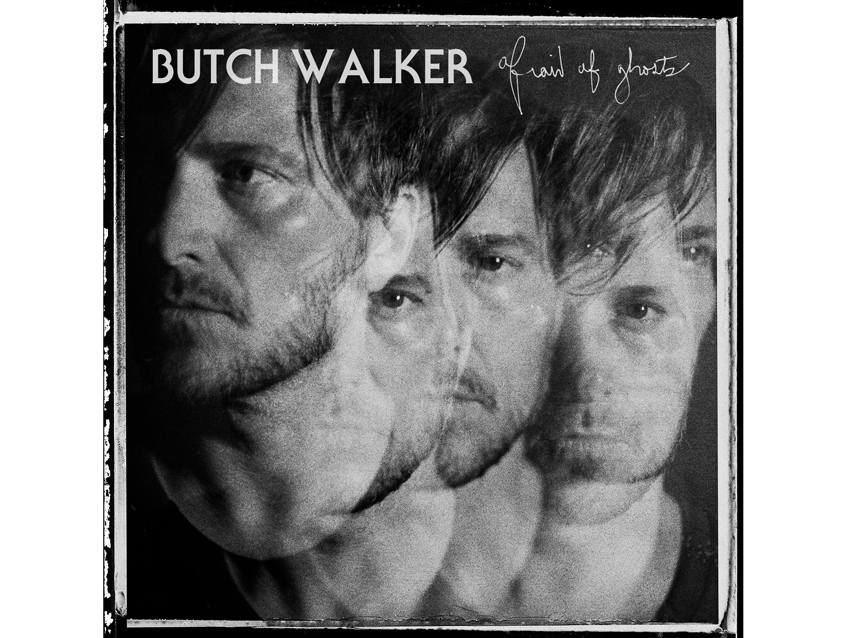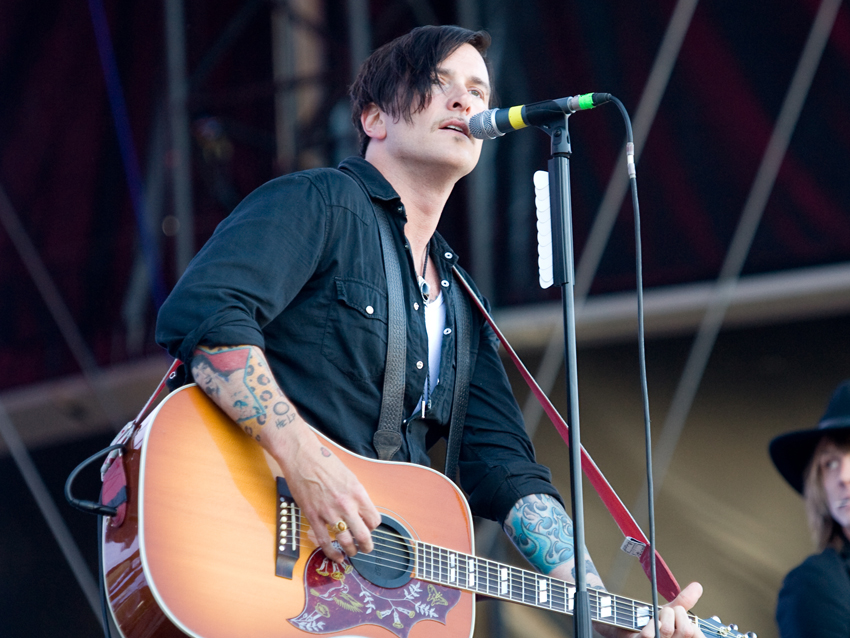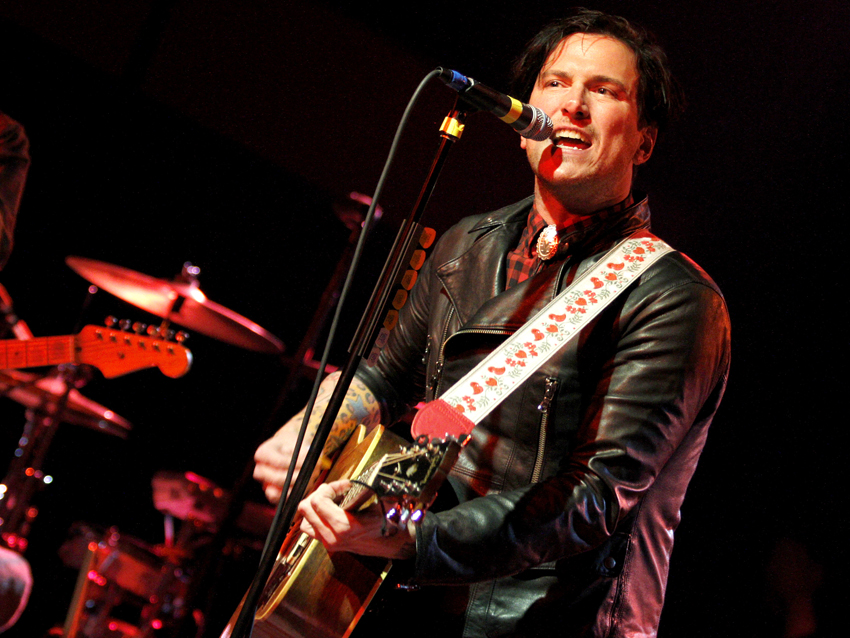
Butch Walker's top 5 tips for producers
For his upcoming album, Afraid Of Ghosts (due out February 3), singer-songwriter and musician Butch Walker, who self-produced his previous six studio efforts – that is, when he's not helming hits for the likes of Pink, Fall Out Boy, Avril Lavigne, Taylor Swift, Weezer and Panic At The Disco, among others – decided to hand over the production chores to another multi-hyphenate rocker: Ryan Adams.
“Ryan and I have threatened to work on each other's stuff for a while," Walker says. "I was going to produce his latest record he did last year, but then my father died and I went down the rabbit hole for a bit. We reconnected this year at my hotel in NYC. He said that he wanted to hear my new stuff, so we went up to my room, and I played him a bunch of songs on acoustic guitar. On the plane ride back to LA, I texted him and said I wanted him to do my record – he politely agreed. He has always been one of my favorite singer-songwriters.”
Walker and Adams are currently on tour together – their US run of dates winds up in Cartersville, Georgia, on November 29. During a recent break on the road, Walker chatted with MusicRadar about their work together on Afraid Of Ghosts (the album features appearances by Bob Mould and Johnny Depp), and he also offered his own top five tips for producers.
Being that you're a more than capable guy in the studio, why did you want somebody else to produce you, especially since you've done all your other records yourself?
“I didn't enjoy producing my own records anymore, honestly. It just gets to the point where you get too comfortable with yourself – playing, recording techniques – and then you just burn out on the art of recording. I felt like I had a great year in writing songs, due to the loss of my father a year ago, and I really wanted to be inspired to go in and record them."
Was there anything particularly notable that Ryan said he wanted to do differently than what you’ve done on your self-produced solo albums? Any one thing you can point to that he did that made you go, “Now, I wish I had thought of that… ”?
“We had some funny texts and phone conversations about this. He was really insistent on using his engineer, players, studio and equipment, which I was more than happy to do. He didn't want me in my comfort zone at all, which I also loved. I would play him songs, and he would make me sing them immediately in much lower keys so that I was singing in a range and volume that isn't heard on my records in the past.
“He liked how I sounded in my hotel room, when I was singing the songs under my breath a bit, so as to not piss off the neighbors. I think I just got so used to screaming everything and pushing the vocal limit on all of my records in the past, so it was hard for me to lay back and sing like I do when I serenade my son or sing around a fire. It really helped, and I ended up loving the common thread throughout the record of this approach. Oh, we also listened to a lot of Danzig before we would tackle a tune. Try it – it really works.”
You said that “sometimes a fight is what you need,” but were there any times when Butch Walker the artist had a hard time letting go of Butch Walker the producer?
“Oh, fuck yeah. I mean, as an artist, I have never been wrong in my mind when it comes to my own stuff, so it is hard when you meet yourself in the mirror, and in that mirror is Ryan yelling at me to stop doing this and stop doing that. There were a couple of times when I wanted to punch him, and I think he even knew it. But it was because we both have a lot of pride, and he has zero filter.
“I would play him a song about my father, and it would be super personal to me, and he would say, ‘Yeah we're not doing that one… ’ And I would say, ‘What the fuck did you say to me?’ But then I would hear him out on his argument as to why it didn't work on this record as a ‘body of work.’ and I would go, ‘Yeah… I guess you're right.’ It was a good lesson. He was really listening and really being present and protective of this record as a whole.
“I remember when he said, ‘We need to record song six on the album today.’ I thought to myself, "Who in the hell already has the order of this record figured out before it is even recorded?’ But he was right. Fuck. I hate when someone else is right.”
I love your new song Chrissie Hynde. Has she heard it yet, and if so, what was her reaction?
“Thank you so much. And yes, the first thing I did was send it to Chrissie. She told me she really dug it, and that's all I can ask for. I’m obviously a huge Pretenders fan, and she is one of my musical heroes since I was a wee lad. We’ve actually talked a bunch since then, and we’re gonna get in the studio together in a couple months and bang around. Life is crazy.”
For Butch Walker/Ryan Adams tour dates, click this link. You can pre-order the album Afraid Of Ghosts at iTunes. On the following pages, Walker runs down his top five tips for producers.


Meet the artist first
“This is so important. Just have lunch, coffee, drinks, whatever – anything but sex. It's so important to know who you are working with, whether or not you’re compatible, if you can see a spark, what their personality is like.
“I can usually prepare for a recording session with an artist much easier if I can figure them out a bit first. Talking is my favorite part of the record. Exchanging stories, telling jokes, listening to other people's music – all of this makes it less formal. I hate real jobs, and this part of the process keeps producing from feeling like one.”

It's not the gear, bro
“I don't know how many times artists will be doing their first record with a real budget and for a bigger label, and they think they have to go into Abbey Road in London and rent five grand pianos, all the guitars and sitars in the world, blah blah blah.
“The best records, to me, are made in houses, apartment, garages or wherever. I mean, I have two nice little studios, one in LA and one in Nashville, and they’re fun to work in, but they're by no means museums with every piece of pro recording gear.
“I can make a record with all cheap mics and a laptop and get some fun results – although, granted, I have 24-track tape machines and old boards and outboard gear. But there are no rules: I've heard some pretty awful crap recorded on all-analog gear, and I’ve also heard some pretty warm, fuzzy and cool-sounding records done on computers.
“It's all about making the artist feel super-creative and comfortable enough to let their guard down to throw some fucking confidence into that mic. If you’re telling the singer that that they’re singing through some rare, vintage mic from the 1950s that Ray Charles used and you can't even afford to buy the tubes in it because the mic is worth like 20 grand, chances are that singer is gonna be scared shitless to sing into it.”

Have fun - please
“So many artists torture themselves when making records – for no reason. If it’s a brand-new artist, chances are they’ve never made a real record before, and so they don't have anything to compare the experience to. I’m very proud to say that many artists I’ve worked with told me after the first week of recording that they didn’t know it was going to be so fun and painless.
“Granted, there's never a lack of tantrums being thrown and emotions flowing, but the important thing is to just keep things moving. Nobody has any fun sitting there listening to you indulge your technical fantasies doing a ‘mic cable shootout’ or comparing tubes in your guitar amps. That's when you lose the artist to ‘Words With Friends’ or ‘Flappy Bird’ or whatever garbage is on their iPhones.”

Keep a gun by the recording console
“Now, don't get me wrong: Most A&R guys – that’s a title for label people, which stands for ‘Alcohol and Restaurants’ – are decent people. There's a few that I don't care to ever see or hear; I just don’t need them opening their shitty little mouths making artistic suggestions.
“Most of the time, these guys stay as scarce as rats, that is, until we’ve worked for days on end to make an incredible record. That’s when they usually want to come in at the last minute and ‘really save their artists' record from being ruined’ by offering up some delightful suggestions. Here's a few that I’ve heard firsthand. You can’t make this shit up.
"’I just don't know about the level of the snare drum.’ This was said in reference to a rough mix that I emailed them, with the subject in bold saying, “This is a rough mix. It isn't mixed.”
"’Can we IQ" the drums better?’ Again, this was said about a rough mix. But it's supposed to be ‘EQ,’ as in ‘equalization. It’s not ‘Can the drums sound smarter?’”
"’Make it sound more like Adele.’ This one has been the go-to for about, oh, the last three years.”
"’Can't understand what the girls in the choir are saying on the intro choir piece to this song. Please make more clear sounding.’ Are you ready for this? The choir part was in French. This was an American A&R guy, by the way.”

As a producer, it's OK to be wrong
“Oh, God, that was hard for me to say. But it is true. When you’re trying to make a record that an artist can be proud of, you have to swallow a little pride sometimes and just know that they aren't always gonna like the same shit you do.
“Honestly, I would way rather have the band blame themselves if their record is poorly received than for them to blame the producer for turning them into something they're not.
“I mean, the public blames us all the time for ‘ruining their favorite band,’ but honestly, most bands I work with have a strict vision of what they want. I just help them see it through. I'm pretty sure it was hard to blame the producer for all of those horrible records in the ‘80 done by really great groups from the ‘70s. Pretty sure that was cocaine.”
Joe is a freelance journalist who has, over the past few decades, interviewed hundreds of guitarists for Guitar World, Guitar Player, MusicRadar and Classic Rock. He is also a former editor of Guitar World, contributing writer for Guitar Aficionado and VP of A&R for Island Records. He’s an enthusiastic guitarist, but he’s nowhere near the likes of the people he interviews. Surprisingly, his skills are more suited to the drums. If you need a drummer for your Beatles tribute band, look him up.
